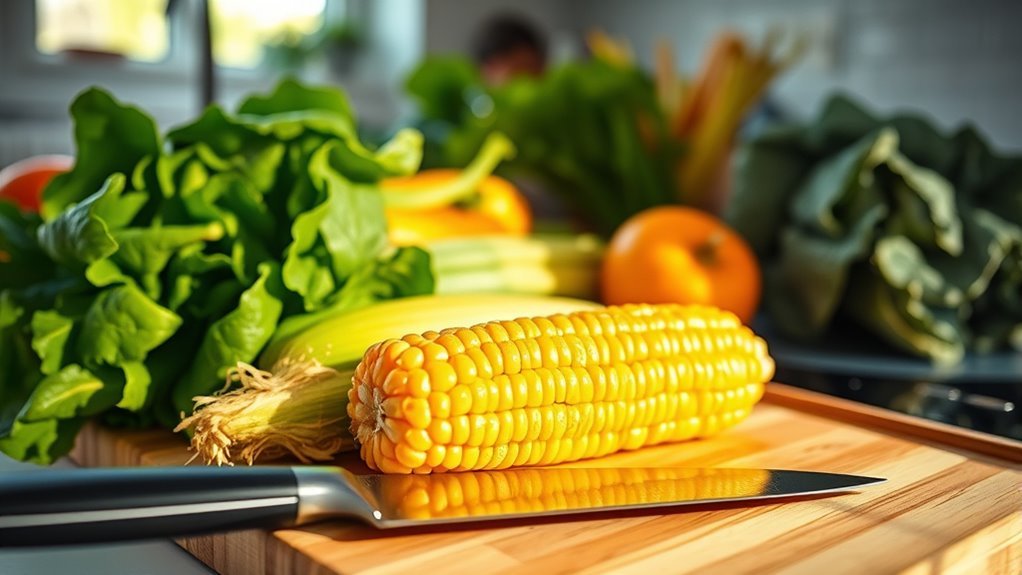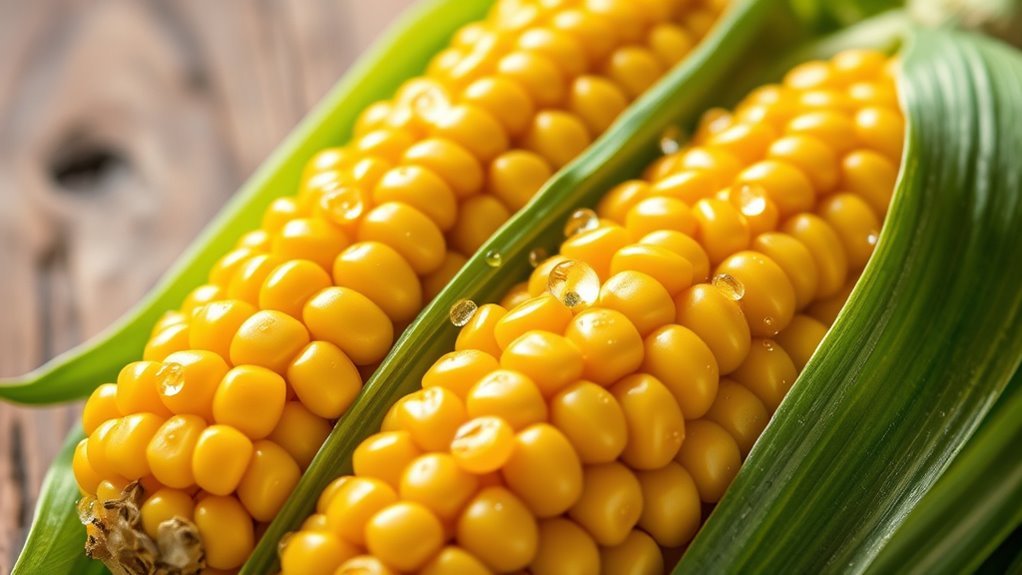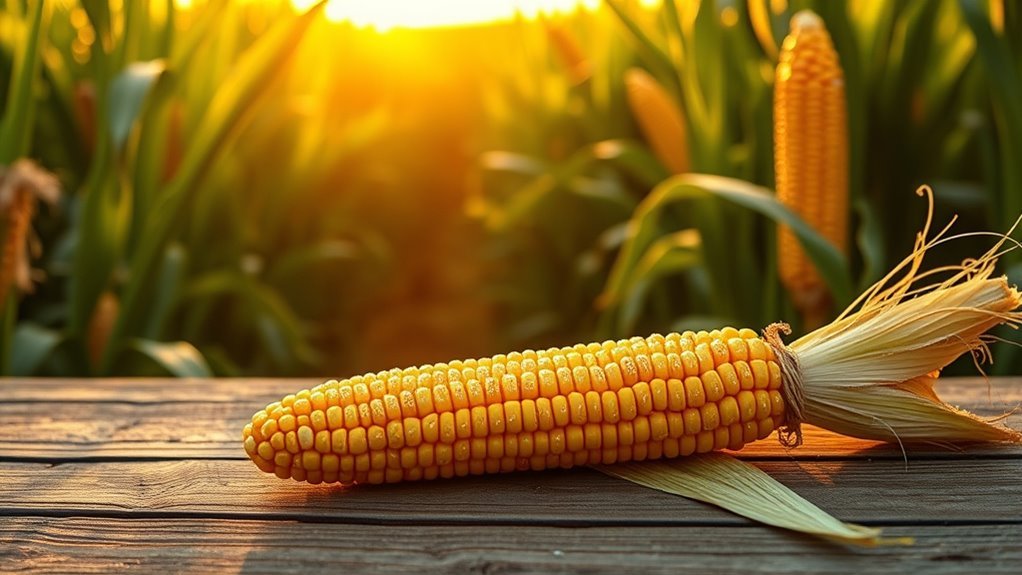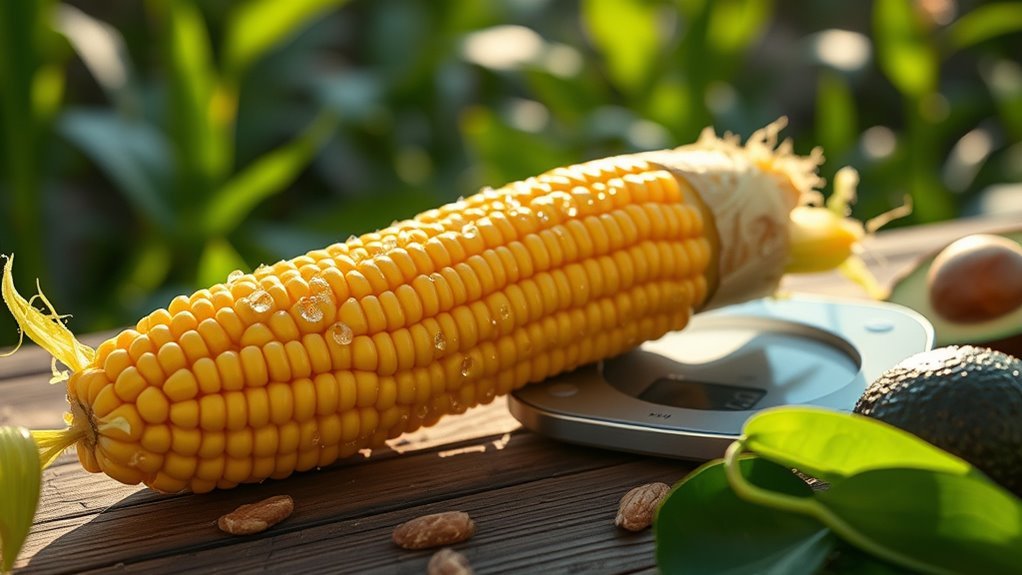Corn isn’t keto-friendly due to its high carbohydrate content. Sweet corn has about 19g of carbs per 100g, while popcorn and cornmeal contain even more. Consuming these can disrupt ketosis by causing spikes in insulin levels. Although corn offers some nutritional benefits, its carbs can hinder your keto goals. If you’re looking for low-carb alternatives, there are plenty of vegetables that fit better with the ketogenic diet. Learn more about these options for a successful keto journey.
Understanding the Ketogenic Diet

When you commence a ketogenic diet, it’s essential to understand its core principles. The ketogenic principles revolve around drastically reducing carbohydrate intake and increasing fats. This shift forces your body to enter a state called ketosis, where it primarily burns fat for energy instead of carbs. One of the key processes you’ll experience is fat adaptation, which occurs as your body becomes efficient at utilizing fat stores. This adaptation can take a few weeks, during which you might feel some initial fatigue. However, once adapted, many find increased energy levels and improved mental clarity. Understanding these fundamentals can empower you to embrace the freedom of a ketogenic lifestyle, leading to potential weight loss and enhanced overall health.
Nutritional Profile of Corn

Corn, often considered a staple in many diets, has a unique nutritional profile that’s important to examine, especially for those following a ketogenic lifestyle. Various corn varieties, like sweet corn and popcorn, offer different nutrient densities. Sweet corn is rich in vitamins A and C, along with fiber, while popcorn can provide a satisfying whole grain option. However, it’s crucial to note that corn generally has a higher carbohydrate content compared to other vegetables. This can impact your ketosis if consumed in large quantities. Understanding the nutrient density of corn can help you make informed choices, ensuring you enjoy the flavors of this versatile ingredient without compromising your keto goals. Always consider portion sizes and balance in your diet.
Carbohydrate Content in Corn

For those on a ketogenic diet, understanding the carbohydrate content in corn is essential. Corn, while delicious, can be a significant source of carbs, which may hinder your ketosis goals. Different corn varieties offer varying carb counts, making it vital to choose wisely.
| Corn Variety | Carbs per 100g | Notes |
|---|---|---|
| Sweet Corn | 19g | High in sugar |
| Popcorn | 78g | Light, but high in carbs |
| Cornmeal | 73g | Used in baking |
| Corn on the Cob | 19g | Seasonal favorite |
When considering your carb sources, be mindful of these figures. If you’re aiming to stay in ketosis, limiting corn intake is advisable.
Impact of Corn on Ketosis
When considering corn’s impact on ketosis, it’s crucial to analyze its carbohydrate content and glycemic index. High carb levels can hinder your ability to maintain ketosis, while the glycemic index can indicate how corn affects your blood sugar. However, corn also offers nutritional benefits that might be worth weighing against its carb count.
Carb Content Analysis
Although many people enjoy corn as a staple in their diets, its carbohydrate content can pose challenges for those following a ketogenic lifestyle. Corn’s high carb content can limit your options among carb sources, especially if you’re trying to maintain ketosis.
Here’s a quick analysis of corn’s carb content compared to other common foods:
| Food Item | Total Carbs (per 100g) | Net Carbs (per 100g) |
|---|---|---|
| Sweet Corn | 19g | 16g |
| Cauliflower | 5g | 3g |
| Zucchini | 3g | 3g |
| Spinach | 3.6g | 1g |
| Broccoli | 7g | 4g |
These diet variations highlight that while corn can be enjoyed occasionally, it may not fit well within strict ketogenic plans.
Glycemic Index Considerations
Understanding the glycemic index (GI) of foods is important for anyone monitoring their carb intake, especially on a ketogenic diet. Corn typically has a higher GI than other keto-friendly vegetables, leading to a significant glycemic response. This can spike your blood sugar levels, which may not align with your goal of maintaining ketosis. When you’re aiming for a state of ketosis, it’s essential to evaluate how foods affect your insulin sensitivity. High-GI foods like corn can trigger insulin release, potentially disrupting your metabolic state. If you’re committed to a keto lifestyle, it’s wise to limit or avoid corn to maintain stable blood sugar levels and support your journey toward ideal health. Your choices can empower you to achieve your dietary goals.
Nutritional Benefits Overview
While corn does offer some nutritional benefits, its impact on ketosis can be significant. If you’re considering corn in your diet, here are some key points about its nutritional value and health benefits:
- Fiber Content: It provides dietary fiber, which aids digestion.
- Vitamins & Minerals: Corn is rich in essential nutrients like B vitamins and magnesium.
- Antioxidants: It contains antioxidants like lutein and zeaxanthin, promoting eye health.
- Energy Source: Corn is high in carbohydrates, which can disrupt ketosis.
For those pursuing a keto lifestyle, the high carbohydrate content may outweigh these benefits, making it essential to weigh your options wisely. Embrace your freedom to choose, but keep your goals in mind!
Different Types of Corn
Corn comes in various types, each with unique characteristics and uses. Sweet corn is the most popular type for fresh eating, known for its high sugar content and tender kernels. Then you have popcorn varieties, which pop when heated due to their hard outer shell and moisture content. Cornmeal types, like fine or coarse, are used in baking and cooking, offering different textures and flavors. Additionally, corn derivatives, such as corn syrup and cornstarch, are prevalent in processed foods. When it comes to corn nutrition, it’s a good source of carbohydrates, fiber, and essential vitamins. However, if you’re on a keto diet, you’ll want to be mindful of these factors when considering corn’s place in your meals.
Alternative Low-Carb Vegetables
If you’re looking for alternatives to corn that fit into a low-carb or keto diet, there are several vegetables that can satisfy your cravings without the high carbohydrate content. Here are some fantastic options:
- Cauliflower rice – A versatile substitute, perfect for stir-fries and grain bowls.
- Zucchini noodles – Spiralized zucchini makes a great low-carb pasta alternative.
- Spinach salads – Nutrient-dense and invigorating, easy to customize with toppings.
- Broccoli florets – Crunchy and filling, great for roasting or steaming.
You can also enjoy bell peppers, asparagus spears, eggplant slices, and mushroom caps to diversify your meals. Embracing these low-carb vegetables allows you to enjoy delicious dishes while staying true to your keto lifestyle!
Incorporating Corn in Moderation
Although many people on a keto diet typically avoid high-carb foods, incorporating corn in moderation can be possible with careful planning. By focusing on moderate servings, you can enjoy corn without derailing your progress. It’s essential to be mindful of your overall carbohydrate intake, so consider measuring out your portions. For example, a small ear of corn or a couple of tablespoons of corn can fit into your daily carb limits while still allowing you to savor its sweet taste. Pair corn with low-carb vegetables or proteins to create balanced meals. Remember, the key is moderation and mindful eating, ensuring that you don’t exceed your carb goals while still enjoying the occasional treat. Embrace flexibility within your keto journey!
Personalizing Your Keto Journey
As you begin your keto journey, personalizing your approach can make all the difference in achieving sustainable results. Embracing your unique path means aligning your diet with your personal preferences and individual goals. Here are some key aspects to reflect on:
Personalizing your keto journey is essential for achieving lasting success and enjoying the process.
- Taste: Choose foods you genuinely enjoy to make the journey more enjoyable.
- Lifestyle: Adapt your meal plan to fit your daily routine and commitments.
- Nutrition: Focus on getting essential nutrients while keeping carbs low.
- Flexibility: Allow room for adjustments as your body and preferences evolve.
Making Informed Dietary Choices
When you’re maneuvering the keto diet, making informed dietary choices is vital for success. Understanding your dietary preferences helps you select foods that align with your goals. Emphasize low-carb options, and be aware of hidden sugars in products that may seem keto-friendly. Mindful eating plays an important role; take the time to read labels and research ingredients. For instance, corn may seem appealing but is high in carbs, making it less suitable for your keto lifestyle. Adopting a proactive approach lets you enjoy the freedom of choice while staying on track. Remember, it’s about making decisions that support your health and well-being, allowing you to thrive on your keto journey without feeling restricted.
Is corn keto friendly?
Corn is generally not considered keto-friendly due to its relatively high carbohydrate content. A typical serving of corn can contain around 15-20 grams of carbs, which can quickly exceed the daily carb limit for those following a ketogenic diet. Therefore, it’s best to limit or avoid corn if you are aiming to stay in ketosis.
What is the carb content of corn?
The carbohydrate content of corn can vary depending on the type and preparation method. For example, one cup of cooked corn kernels contains approximately 27 grams of carbohydrates. This includes around 3 grams of fiber, resulting in a net carb count of about 24 grams, which is significantly high for those on a strict keto diet.
Are there any low-carb alternatives to corn?
Yes, there are several low-carb alternatives to corn that are more suitable for a ketogenic diet. Some popular options include zucchini, cauliflower, and avocado. These vegetables are lower in carbohydrates and can be used in various recipes to mimic the texture or flavor of corn without the high carb count.
Can I eat corn in moderation on a keto diet?
While some people on a keto diet may choose to indulge in corn occasionally, it is crucial to do so in moderation and be mindful of your overall carbohydrate intake. If you do consume corn, ensure that it fits within your daily carb limit and that you balance it with lower-carb foods throughout the day.
What are the health benefits of corn?
Corn is a source of several important nutrients, including fiber, vitamins (such as B vitamins), and minerals (like magnesium and phosphorus). It also contains antioxidants that can help reduce inflammation. However, for those on a keto diet, the benefits may be outweighed by its higher carbohydrate content. It’s important to consider your dietary goals when evaluating the health benefits of corn.
References
- https://www.ncbi.nlm.nih.gov/pmc/articles/PMC7070587/
- https://www.healthline.com/nutrition/keto-diet-food-list
- https://www.webmd.com/diet/obesity/corn-keto-friendly
- https://www.medicalnewstoday.com/articles/321666
- https://www.mayoclinic.org/healthy-lifestyle/nutrition-and-healthy-eating/expert-answers/keto-diet/faq-20410992
- https://www.dietdoctor.com/low-carb/keto/corn
- https://www.verywellfit.com/the-keto-diet-5110394
- https://www.corn.org/what-is-corn/corn-nutrition-facts/


